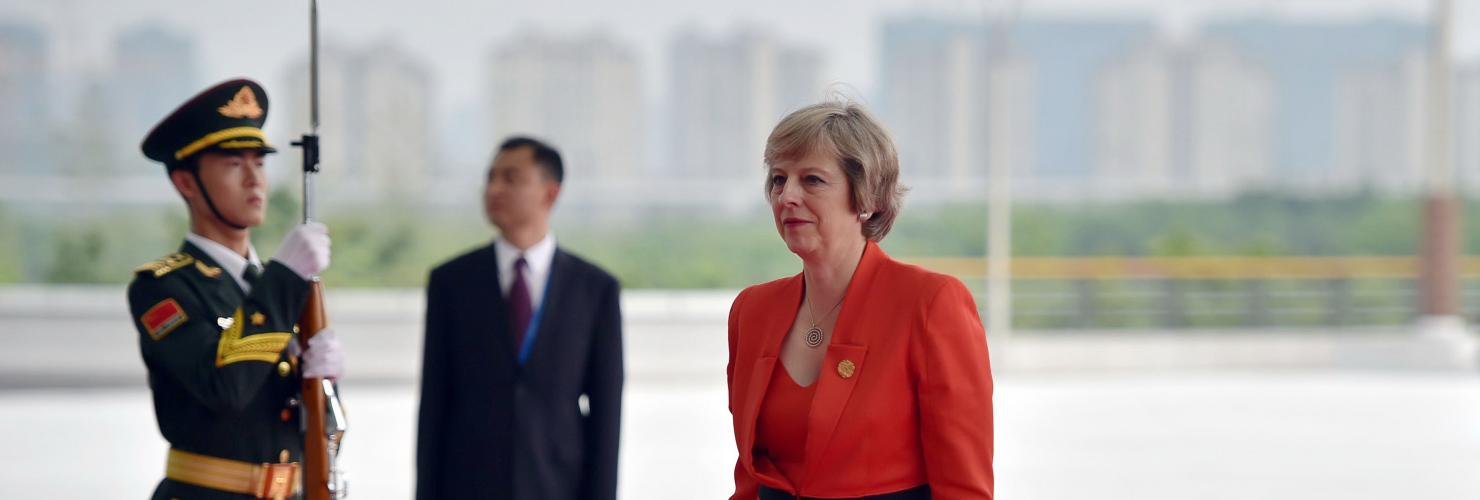

Brexit’s false eastern promise
The British Prime Minister seems determined to forge a “Golden Era” of UK-China relations, in the apparent hope that a free trade agreement with China can make up for the economic consequences of pending Brexit. But the wisdom of Theresa May’s course is being questioned domestically - the UK Parliament’s august Foreign Affairs Committee recently called for a re-think of what it views as Britain’s one-dimensional, trade-driven China policy.
Theresa May’s leaked decision to allow Huawei a part in 5G roll-out – in the face of opposition from the United States and some of her own ministers – indicates she is determined to chase a “Golden Era” of UK-China relations. Her early moves as Prime Minister suggested misgivings about this David Cameron legacy – hoping for more trade, his finance minister, George Osborne, declared Britain “China’s best friend in the West.” But now she dares not put at risk what some in the UK think is a Brexit lifeline.
Bogged down in the Brexit process and facing disruption of existing political and commercial ties, May’s Britain has perhaps had little choice. Her pursuit of Brexit – departing the Single Market and Customs Union – and the Brexiteer’s promise of a UK-China free trade agreement as a Brexit selling-point have redoubled the mercantile logic already evident under May’s predecessor.
But China has changed since Cameron and Osborne set out their decidedly one-dimensional approach. President Xi Jinping’s consolidation of power at home, his more assertive foreign policy, the militarization of the South China Sea, the abuses in Xinjiang, the tightening of control over Hong Kong – all have become hard to square with a whole-hearted and uncritical wooing of Beijing.
Parliamentary committee questions wisdom of seeking “Golden Era” of China relations
The wisdom of seeking a “Golden Era” was recently questioned by the House of Commons Foreign Affairs Committee. Taking a clear-eyed view of China under Xi and its challenges for UK foreign policy, a timely committee report called China “a force for order – but not liberal order” and “a viable partner on some issues but an active challenger on others”. In the Committee’s view, the strategy “to build a deeper partnership with China” was “not sufficient as a single overarching goal”.
The eleven committee members – five from the ruling Conservative party, and six from the opposition Labour Party and Scottish National Party – lamented that London had been “unwilling to face this reality”. They warned that “economic considerations [may] crowd out questions of UK strategic interests, values and national security” and called for the UK approach to be “recalibrated” through a new, public China strategy document, that the Committee wants published by 2020.
May’s attempts to forge a golden partnership with China in the face of these tensions have made her already dysfunctional government – preoccupied with Brexit – look incoherent. Never more so than in the handling of Gavin Williamson, erstwhile Defence Secretary, recently fired for leaking the contentious, confidential decision about Huawei by the government’s National Security Council.
In February, Williamson announced a Freedom of Navigation Operation (FONOP) in the South China Sea, prompting mockery in the UK and anger in Beijing. Golden Era architect Osborne spoke of “gunboat diplomacy” harking back to Britain’s imperial era. The barb drowned out any discussion about FONOPs and highlighted the prevailing view that China is a market to be wooed at all costs. May’s office conspicuously did not back Williamson, briefing journalists his was “an idiotic speech”.
Beijing, meanwhile, responded by cancelling a planned visit by Osborne’s successor as finance minister, Philip Hammond. Beijing had punished previous UK FONOPs by declining to take part in the 2018 edition of the Sino-British Economic and Financial Dialogue, which had previously taken place annually. (Beijing finally agreed to the next Dialogue in reward for Hammond attending April’s Belt and Road Forum – and very possibly May’s cold response to Williamson’s FONOP announcement.)
UK is more susceptible to economic strong-arming by Beijing than ever before
Beijing knows the value ascribed to Chinese commerce by May and other politicians in trade deal-hunting Brexit Britain. As the FONOP furore showed, many in the UK see China ties purely through the Brexit lens – as a market to make up for lost trade with continental Europe. Williamson was widely criticized for endangering trade ties, showing that Osborne was not alone in internalizing Beijing’s message that economic opportunity is dependent on political good behavior. As a result, the UK is more susceptible to economic strong-arming by Beijing than at any time in living memory.
But the UK would do well to remember that in the pre-Golden Era Cameron-Osborne years, trade with China grew while diplomatic exchanges were frozen after the Prime Minister met the Dalai Lama. For all Beijing’s use of its economic weight to discipline apparent transgressions by its international partners, the evidence is far from clear that displeasing the denizens of Zhongnanhai has a devastating economic impact. Brexit-induced mercantilism shouldn’t stop the UK from taking the nuanced and robust approach to Beijing called for in the report by the Foreign Affairs Committee.
The UK would benefit from the public debate the Committee hopes to engender. It should focus on what a free-trade deal with China can and cannot promise in the Brexit context: Beijing will drive a hard bargain, and not allow the kind of market access that would have real impact on the UK’s trade outlook. Sadly, the paucity of public understanding in the UK of a changing China, and the preoccupation with Brexit leave little room for optimism that the Committee’s deadline will be met.
